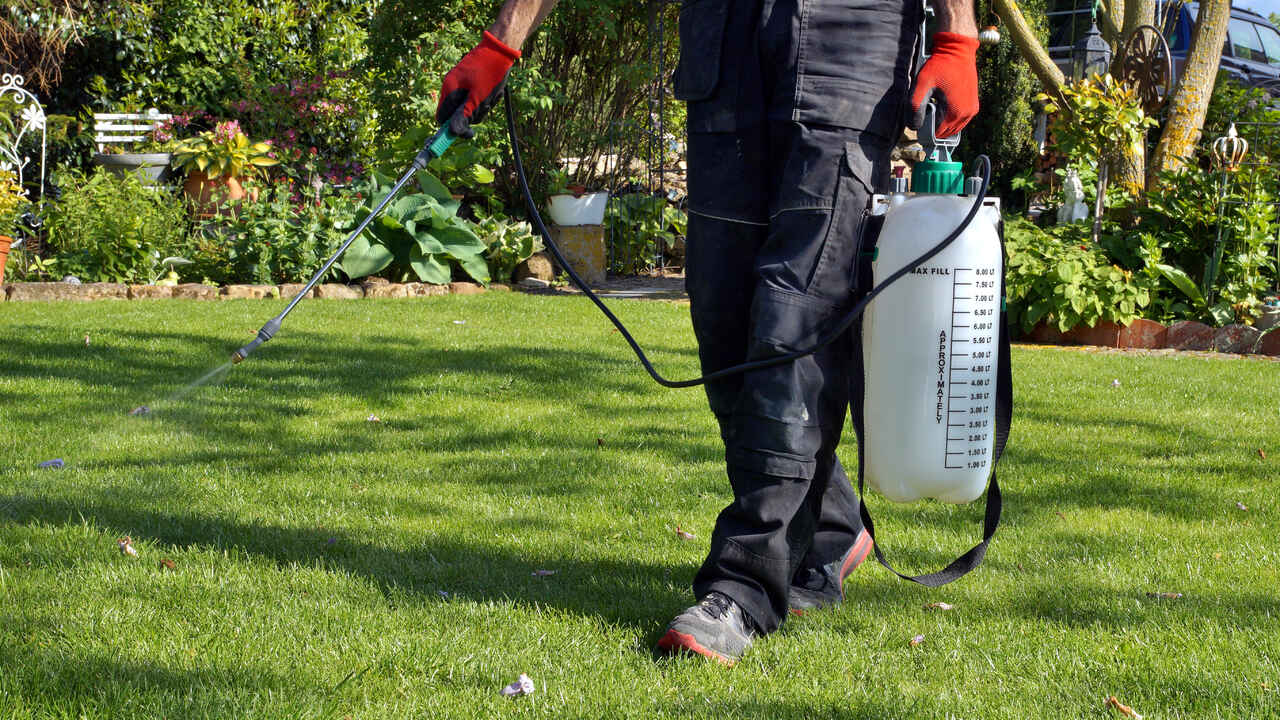
Beautify your yard responsibly with these suggestions for using lawn products safely.
Lush, green lawns are beautiful. But in order to get and keep them that way, we typically need to use products such as pesticides and fertilizers. There are risks associated with these products because they are made from chemicals that can be dangerous to humans and animals. So care must be taken when using and storing them.
It’s a common myth that some pesticides are “safe” and others are “dangerous.” All chemicals have the potential to be hazardous. If you touch, eat or breathe in a chemical substance, it may harm your health. Some chemicals cause immediate effects, such as rashes, vomiting, excessive sweating, dizziness, headaches, muscle pains, cramps, eye irritation and respiratory problems. Others have been linked to long-term effects such as cancer, birth defects, and damage to the kidneys, liver and nervous system.
When using lawn treatments containing any type of chemicals, it’s important to take precautions to keep yourself safe. It’s equally important to take steps to make sure anyone in your household or who visits your home is safe.
How to Safely Use Lawn Treatments
To safely use pesticides and fertilizers:
-
-
- Read the label carefully and follow all instructions.
- Wear a long-sleeved shirt, pants, socks and closed-toe shoes.
- Protect your face with protective goggles, a hat and a face mask that covers the nose and mouth.
- Wear gloves made from nitrile, butyl or neoprene. Never wear leather or fabric gloves as they absorb pesticides.
- If any chemicals get on your face, hands or skin, wash them off immediately.
-
Once you are done applying lawn products:
-
-
- Wash your hands thoroughly with soap and hot water. Shower as soon as possible.
- Change your clothes, put them in a plastic bag and leave the bag outside. Wash clothes separately from other laundry before wearing again.
- Store your shoes outside the house, away from children and pets.
- Check product label to see how long you need to wait before the lawn is safe. Stay off the lawn and keep children and pets away from the area for at least as long as is recommended.
-
How to safely store pesticides, fertilizers and other chemicals:
-
-
- Always store any product containing chemicals in its original container and keep the label with safety instructions.
- Keep out of reach of children and pets. It’s best to store in a locked cabinet in a well-ventilated utility area or garden shed.
- Store away from human or animal food and medical supplies.
- If flammable, keep away from living areas and far away from the furnace, car, grill or lawn mower.
- Keep away from areas where flooding is possible or where chemicals could leak into the water supply.
-
Most lawn products rely on chemicals to do what they’re intended to do. There are also more natural, organic ways to get the job done. These treatments are typically safer, but they may not always be as effective. If you choose to use chemical-based lawn treatments like pesticides and fertilizers, carefully follow all safety instructions and use responsibly.
Copyright 2022 © Baldwin Publishing, Inc. All rights reserved.
Health eCooking® is a registered trademark of Baldwin Publishing, Inc. Cook eKitchen™ is a designated trademark of Baldwin Publishing, Inc. Any duplication or distribution of the information contained herein without the express approval of Baldwin Publishing, Inc. is strictly prohibited.
Date Last Reviewed: January 17, 2022
Editorial Review: Andrea Cohen, Editorial Director, Baldwin Publishing, Inc. Contact Editor
Medical Review: Perry Pitkow, MD
Learn more about Baldwin Publishing Inc. editorial policy, privacy policy, ADA compliance and sponsorship policy.
No information provided by Baldwin Publishing, Inc. in any article is a substitute for medical advice or treatment for any medical condition. Baldwin Publishing, Inc. strongly suggests that you use this information in consultation with your doctor or other health professional. Use or viewing of any Baldwin Publishing, Inc. article signifies your understanding and agreement to the disclaimer and acceptance of these terms of use.